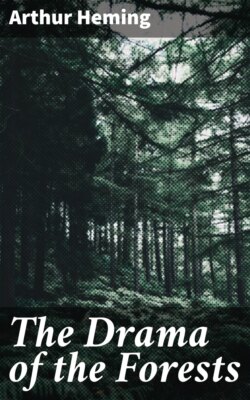Читать книгу The Drama of the Forests - Arthur Heming - Страница 13
На сайте Литреса книга снята с продажи.
MEETING OO-KOO-HOO
ОглавлениеTable of Contents
About ten o'clock on the morning after our arrival at Fort Consolation, Free Trader Spear left for home with my promise to paddle over and dine at Spearhead next day.
At noon Factor Mackenzie informed me that he had received word that Oo-koo-hoo—The Owl—was coming to the Fort that afternoon and that, taking everything into consideration, he thought Oo-koo-hoo's hunting party the best for me to join. It consisted, he said, of Oo-koo-hoo and his wife, his daughter, and his son-in-law, Amik—The Beaver—and Amik's five children. The Factor further added that Oo-koo-hoo was not only one of the greatest hunters, and one of the best canoe-men in that district, but in his youth he had been a great traveller, as he had hunted with other Indian tribes, on Hudson Bay, on the Churchill, the Peace, the Athabasca, and the Slave rivers, and even on the far-away Mackenzie; and was a master at the game. His son-in-law, Amik, was his hunting partner. Though Amik would not be home until to-morrow, Oo-koo-hoo and his wife, their daughter and her children were coming that afternoon to get their "advances," as the party contemplated leaving for their hunting grounds on the second day. That I might look them over while they were getting their supplies in the Indian shop, and if I took a fancy to the old gentleman—who by the way was about sixty years of age—the trader would give me an introduction, and I could then make my arrangements with the hunter himself. So after dinner, when word came that they had landed, I left the living room for the Indian shop.
In the old days, in certain parts of the country, when the Indians came to the posts to get their "advances" or to barter their winter's catch of fur, the traders had to exercise constant caution to prevent them from looting the establishments. At some of the posts only a few Indians at a time were allowed within the fort, and even then trading was done through a wicket. But that applied only to the Plains Indians and to some of the natives of the Pacific Coast; for the Strong Woods people were remarkably honest. Even to-day this holds good notwithstanding the fact that they are now so much in contact with white men. Nowadays the Indians in any locality rarely cause trouble, and at the trading posts the business of the Indian shops is conducted in a quiet and orderly way.
The traders do most of their bartering with the Indians in the early summer when the hunters return laden with the spoils of their winter's hunt. In the early autumn, when the Indians are about to leave for their hunting grounds, much business is done, but little in the way of barter. At that season the Indians procure their outfit for the winter. Being usually insolvent, owing to the leisurely time spent upon the tribal camping grounds, they receive the necessary supplies on credit. The amount of credit, or "advances," given to each Indian seldom exceeds one third of the value of his average annual catch. That is the white man's way of securing, in advance, the bulk of the Indian's prospective hunt; yet, although a few of them are sometimes slow in settling their debts, they are never a match for the civilized white man.
When I entered the trading room I saw that it was furnished with a U-shaped counter paralleling three sides of the room, and with a large box-stove in the middle of the intervening space. On the shelves and racks upon the walls and from hooks in the rafters rested or hung a conglomeration of goods to be offered in trade to the natives. There were copper pails and calico dresses, pain-killer bottles and Hudson's Bay blankets, sow-belly and chocolate drops, castor oil and gun worms, frying-pans and ladies' wire bustles, guns and corsets, axes and ribbons, shirts and hunting-knives, perfumes and bear traps. In a way, the Indian shop resembled a department store except that all the departments were jumbled together in a single room. At one post I visited years ago—that of Abitibi—they had a rather progressive addition in the way of a millinery department. It was contained in a large lidless packing case against the side of which stood a long steering paddle for the clerk's use in stirring about the varied assortment of white women's ancient headgear, should a fastidious Indian woman request to see more than the uppermost layer.
Already a number of Indians were being served by the Factor and Delaronde, the clerk, and I had not long to wait before Oo-koo-hoo appeared. I surmised at once who he was, for one could see by the merest glance at his remarkably pleasant yet thoroughly clever face, that he was all his name implied, a wise, dignified old gentleman, who was in the habit of observing much more than he gave tongue to—a rare quality in men—especially white men. Even before I heard him speak I liked Oo-koo-hoo—The Owl.
